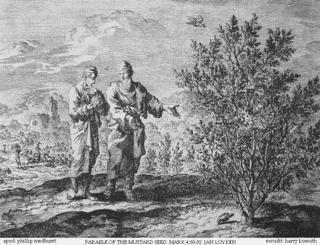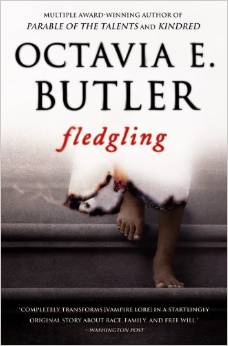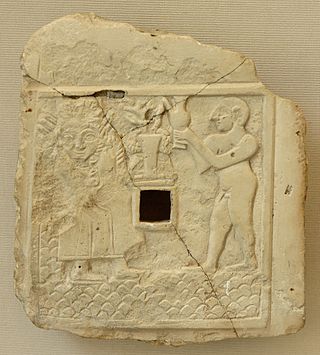Feminist science fiction is a subgenre of science fiction focused on such feminist themes as: gender inequality, sexuality, race, economics, reproduction, and environment. Feminist SF is political because of its tendency to critique the dominant culture. Some of the most notable feminist science fiction works have illustrated these themes using utopias to explore a society in which gender differences or gender power imbalances do not exist, or dystopias to explore worlds in which gender inequalities are intensified, thus asserting a need for feminist work to continue.
Science fiction and fantasy serve as important vehicles for feminist thought, particularly as bridges between theory and practice. No other genres so actively invite representations of the ultimate goals of feminism: worlds free of sexism, worlds in which women's contributions are recognized and valued, worlds that explore the diversity of women's desire and sexuality, and worlds that move beyond gender.
Fertility rites or fertility cult are religious rituals that are intended to stimulate reproduction in humans or in the natural world. Such rites may involve the sacrifice of "a primal animal, which must be sacrificed in the cause of fertility or even creation".

Octavia Estelle Butler was an American science fiction author and a multiple recipient of the Hugo and Nebula awards. In 1995, Butler became the first science-fiction writer to receive a MacArthur Fellowship.

The post-tribulation rapture doctrine is the belief in a combined resurrection and gathering of the saints coming is after the Great Tribulation.

The Parable of the Mustard Seed is one of the shorter parables of Jesus. It appears in Matthew (13:31–32), Mark (4:30–32), and Luke (13:18–19). In the Gospels of Matthew and Luke, it is immediately followed by the Parable of the Leaven, which shares this parable's theme of the Kingdom of Heaven growing from small beginnings. It also appears in the non-canonical Gospel of Thomas.

Toshi Reagon is an American musician of folk, blues, gospel, rock and funk, as well as a composer, curator, and producer.

Parable of the Sower is a 1993 speculative fiction novel by American writer Octavia E. Butler. It is set in a post-apocalyptic Earth heavily affected by climate change and social inequality. The novel follows Lauren Olamina, a young woman who can feel the pain of others and becomes displaced from her home. Several characters from various walks of life join her on her journey north and learn of a religion she has discovered and titled Earthseed. The main tenets of Earthseed are that "God is Change" and believers can "shape God" through conscious effort to influence the changes around them. Earthseed also teaches that it is humanity's destiny to inhabit other planets and spread the "seeds" of the Earth.

Parable of the Talents is a science fiction novel by the American writer Octavia E. Butler, published in 1998. It is the second in a series of two, a sequel to Parable of the Sower. It won the Nebula Award for Best Novel.

Lilith's Brood is a collection of three works by Octavia E. Butler. The three volumes of this science fiction series were previously collected in the now out-of-print omnibus edition Xenogenesis. The collection was first published under the current title of Lilith's Brood in 2000.

The Patternist series is a group of science fiction novels by Octavia E. Butler that detail a secret history continuing from the Ancient Egyptian period to the far future that involves telepathic mind control and an extraterrestrial plague. A profile of Butler in Black Women in America notes that the themes of the series include "racial and gender-based animosity, the ethical implications of biological engineering, the question of what it means to be human, ethical and unethical uses of power, and how the assumption of power changes people."

The Parable of the Weeds or Tares is a parable of Jesus which appears in Matthew 13:24–43. The parable relates how servants eager to pull up weeds were warned that in so doing they would root out the wheat as well and were told to let both grow together until the harvest. Later in Matthew, the weeds are identified with "the children of the evil one", the wheat with "the children of the Kingdom", and the harvest with "the end of the age". A shorter, compressed version of the parable is found without any interpretation in the apocryphal Gospel of Thomas.
Stewardship is a theological belief that humans are responsible for the world, humanity, and the gifts and resources that have been entrusted to us. Believers in stewardship are usually people who believe in one God who created the universe and all that is within it, also believing that they must take care of creation and look after it. Creation includes animals and the environment. Many religions and denominations have various degrees of support for environmental stewardship. It can have political implications, such as in Christian Democracy.

Fledgling is a science fiction vampire novel by American writer Octavia E. Butler, published in 2005.

Survivor is a science fiction novel by American writer Octavia E. Butler. First published in 1978 as part of Butler's "Patternist series", Survivor is the only one of Butler's early novels not to be reprinted after its initial editions. Butler expressed dislike for the work, referring to it as "my Star Trek novel."

Wild Seed is a science fiction novel by American writer Octavia Butler. Although published in 1980 as the fourth book of the Patternist series, it is the earliest book in the chronology of the Patternist world. The other books in the series are, in order within the Patternist chronology: Mind of My Mind (1977), Clay's Ark (1984), Survivor (1978), and Patternmaster (1976).

Bloodchild and Other Stories is the only collection of science fiction stories and essays written by American writer Octavia E. Butler. Each story and essay features an afterword by Butler. "Bloodchild", the title story, won the Hugo Award and Nebula Award.
The Terasem Movement is a group of three organizations based in the United States. The name was inspired by Earthseed, a fictional religion from the works of Octavia Butler. The movement was founded by Martine Rothblatt and Bina Aspen Rothblatt, and is guided by principles called the "Truths of Terasem".

A vegetation deity is a nature deity whose disappearance and reappearance, or life, death and rebirth, embodies the growth cycle of plants. In nature worship, the deity can be a god or goddess with the ability to regenerate itself. A vegetation deity is often a fertility deity. The deity typically undergoes dismemberment, scattering, and reintegration, as narrated in a myth or reenacted by a religious ritual. The cyclical pattern is given theological significance on themes such as immortality, resurrection, and reincarnation. Vegetation myths have structural resemblances to certain creation myths in which parts of a primordial being's body generate aspects of the cosmos, such as the Norse myth of Ymir.

Adrienne Maree Brown, often styled adrienne maree brown, is a writer, activist and facilitator. From 2006 to 2010, she was executive director of the Ruckus Society. She also co-founded and directed the United States League of Young Voters.














